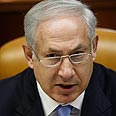The key for a solution to this issue appears to be in the hands of Prime Minister Benjamin Netanyahu, who is aware of US President Barack Obama's pressure to advance the peace process with the Palestinians based on the Saudi initiative. Netanyahu appears to be inclined to accept Barak's formula.
The prime minister clearly realizes that in his first meeting with US President Barack Obama at the White House he will be forced to declare that a Palestinian state will be established alongside the Jewish state at the end of the process.
The heated argument began in internal discussions held between Netanyahu, Barak and Lieberman, but reached a peak in the media campaign conducted by the defense and foreign ministers.
Barak claims, as reported by Ynet earlier this week, that a regional Israeli peace plan based on the Arab peace initiative is the formula Netanyahu must take with him to the White House on May 18.
The defense minister said in a closed forum on Tuesday, "An Israeli plan for a comprehensive regional agreement is the key to Israel's policy in the coming years and a key axis for guaranteeing Israel's future in the region.
"Israel and the US must form the details of this initiative, which also includes guaranteeing Israel's security interests, security-related elements and the State's Jewish character without a right of return."
Lieberman's stance revealed gradually
Lieberman, who still fears a public dispute, said in a Foreign Ministry discussion in recent days that he opposes the Arab initiative. In this statement, the foreign minister sent a mixed message – once towards Barak who is leading the move together with President Shimon Peres, and once towards the United States, after Obama's special envoy to the Middle East George Mitchell expressed his support for advancing the idea during his visit to the region last week.
This message was sharpened Wednesday morning, following the publication of an interview Lieberman gave to a Moscow newspaper two weeks ago. "The US will accept any decision we make," he said in the interview.
This dispute is taking place on the backdrop of Netanyahu's attempt to form a positive diplomatic plan to present to Obama in their upcoming meeting. It's clear to the prime minister that at the end of the day, there will be no escape from the establishment of a Palestinian state alongside Israel.
He is also aware of the heavy American pressure, which was expressed Tuesday in Obama's remarks during his meeting with King Abdullah of Jordan: "We can't talk forever. My hope would be that over the next several months that you start seeing gestures of good faith on all sides. King Abdullah has taken great steps to ensure that the Arab peace initiative sustains itself in terms of Arab support."
Netanyahu understands that the American president publicly supports the stance presented by Barak. At this stage, the prime minister refuses to declare which stance, Barak's or Lieberman's, he plans to support.
Senior Likud officials have said, however, that there is no doubt that Netanyahu will eventually be forced to accept the stance which enables the creation of a Palestinian state alongside Israel, by continuing the talks with the moderate elements.
Netanyahu's red lines
Officially, the prime minister has not made any statements which may indicate that he accepts the two states for two people formula as part of an Israeli regional plan based on the Arab initiative. However remarks he has made at the presence of ministers in internal discussions point to the general direction.
According to a senior Likud official, Netanyahu made it clear in the discussions that he must arrive in Washington with a positive move in regards to the Palestinian issue. The essence of that move was not explained.
The prime minister took the same opportunity, however, the present his red lines for a future Palestinian state. One of the issues he spoke about was the restrictions Israel will insist on, including the authorities given to such a state which may endanger the State of Israel.
He clarified the risks on the strategic level: The demand for a Palestinian entity demilitarized of heavy weapons, an entity whose airspace would be controlled by Israel, an Israeli demand to control the Jewish state's borders with this entity, and a restriction on its alliances with countries like Iran.
Nonetheless, senior officials close to the prime minister said that Israel must not discuss a plan which means all or nothing just yet, as former Prime Minister Barak, Ehud Olmert and Ariel Sharon had done."
"It's possible that what we should bring to the White House is a comprehensive idea based on temporary agreements. We must not leave what can be agreed hostage of what cannot be agreed. The prime minister may have to adopt a step-by-step formula," one of the officials said.


















